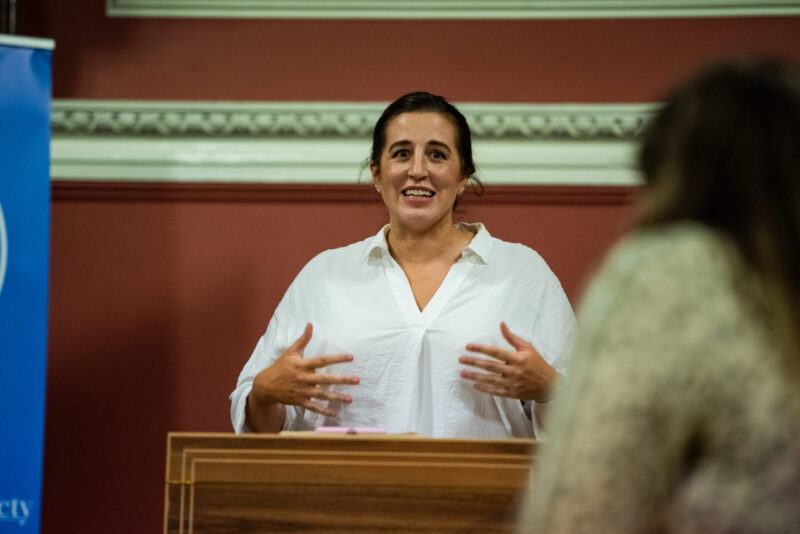As life returns to campus, so too did it return to the illustrious Graduates’ Memorial Building (GMB) last night for its first in-person debate since March 2020. The motion “This House has no faith in RTÉ” saw speakers from the College Historical Society (the Hist), The University Times, Trinity News and Trinity FM presenting their case in a debate chaired by RTÉ researcher and producer of The Two Johnnies Maura Fay.
The excitement in the building was palpable as guests lined up outside to present their tickets and vaccine certs to the waiting committee members. I was struck by the sense of enthusiasm given by guests and committee members alike as they watched people filter into the chamber – from long-time veterans of the society to people attending their very first event, the smiles on people’s faces showed how delighted everyone was to be back.
Making my way into the chamber, I found myself chatting to people I hadn’t seen in more than a year and a half, and even meeting people I had never met in person before, having been a frequenter of Zoom debates. It was slightly jarring to suddenly encounter people who I had only ever seen through the lens of a window on my laptop screen, but it was delightful to finally meet them and get the chance to talk.
Eventually, the room quieted down and Auditor Maggie Larson began the night’s proceedings. Following that (and a humorous speech delivered by Records Secretary Maitiú Charleton over Zoom in which he delightedly proclaimed, “we’re back in the GMB!”), the debate began in earnest. On side proposition was Trinity News Editor Jack Kennedy and News Editor Kate Henshaw along with actress and performer Lucy Holmes, and Martha McKinney-Perry.
Each of them valiantly argued the reasons why RTÉ had failed the public and why we should not place our faith in the broadcaster, with specific arguments including Kennedy’s point that “if the state and the system as we know it gets torn down, RTÉ gets torn down with it”. Henshaw led a compelling plea against the Angelus in aid of survivors of the abuses of the Catholic church and the harms of the Rotunda hospital documentary. Holmes delivered a scathing examination of the censorship laws hanging over RTÉ’s head as well as the nepotism pushing performers away, and McKinney-Perry’s rousing speech held amusing remarks like “in Rural Ireland there are newspapers” and “they also do have internet in Rural Ireland”.
Arguing in opposition were University Times Editor Emer Moreau and Deputy Editor Emma Taggart, Trinity News contributor David Wolfe, and Trinity FM Chairperson and founder of Lockdown FM Arianna Owens. They argued that RTÉ not only gives young journalists a way into the industry, but also raises awareness of incredibly important issues.
Moreau held that while it’s easy to criticise big institutions, not everyone uses Twitter for their news, and that while not a public service, the entertainment RTÉ provides is important. Wolfe continued this argument by pointing out how RTÉ has highlighted previously controversial topics and how the job of RTÉ is not to make up the minds of its audience but to provide them the facts to do so, and Owens rebutted the notion of RTÉ as a nepotistic creative hell.
By far the speech that received the most applause was the passionate plea made by Taggart for RTÉ’s objectivity and role in reducing sectarian accusations in Northern Ireland and providing unbiased reporting on otherwise extremely polarising issues. As she took her seat following her speech, the house erupted into collective, thunderous applause in support of her points – something we missed over the Zoom emoji reaction era.
The motion was resoundingly defeated with calls of “nay!” echoing throughout the room: much to the relief, presumably of the guest chair. While the Hist did have an extremely successful year of Zoom debates last year, the atmosphere, passion, and excitement in that room made it abundantly clear that even though online events are fun, nothing beats the feeling of being there, up close.







